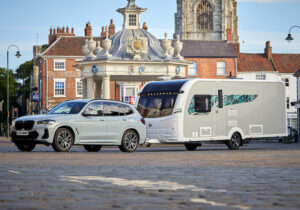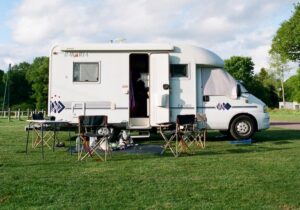It is an often stated misconception that the best cars for towing caravans are the biggest. Granted, large 4Ã-4s and estates crop up in every list due to their impressive grip and power. However traits such as handling and acceleration are equally as important in towing. And when this is taken into account some surprises can occur.
This year the Caravan Club voted for the Towcar Of The Year, and the result threw up one of the most familar names in family motoring. The Volkswagen Golf particularly impressed the 10 judges with strong performances when towing in a variety of situations, practicality as a caravanning family car and high quality cabin.
28 cars tested in this year’s competition were put through their paces at the Millbrook Proving Ground in Bedfordshire. Each car was tested for its towing ability, acceleration, braking, ability to cope with demanding hill starts and an assessment of usability in terms of everyday caravanning.
Explaining the judges’ decision to award the Golf the top accolade, driving judge Barry Williams commented: ‘Absolutely faultless stability made the Golf steadfast on the test track and when the punchy engine had whisked its way to 60 mph it was still ready to accelerate, even in sixth gear. Agile handling enables the car to tackle the most demanding route. The
Volkswagen Golf SE 2.0-litre TDI 140 PS is a truly capable towing vehicle and a worthy winner.’
Below Caravan Times profiles the winners in each category from this year’s awards.
Under £16,000 Class
Shortlisted:
Kia Soul Shaker 1.6 CRDi
Renault Kangoo Expression dCi 106
Winner: Kia Soul Shaker 1.6 CRDi
The Soul Shaker gives a spirited performance, has a usable bodyshape and promises low running costs. The 1.6-litre diesel engine offers reasonable amounts of power and torque for a car of this size. As a towcar for small caravans or trailer tents, Kia’s hatchback is a worthy winner. Biggish door mirrors and a high driving position add to the Soul’s towing credentials.
£16,000 to £20,000 Class
Shortlisted:
Peugeot 3008 Exclusive THP 150
Renault Megane Hatch Dynamique dCi 130
Toyota Verso 2.0 D-4D Man
Volkswagen Golf SE 2.0TDI
Winner: Volkswagen Golf SE 2.0TDI (Overall Caravan Club Towcar of the Year 2010)
The Golf has a great quality cabin with excellent fit and finish, and simple, intuitive switchgear and instrumentation that puts everything where you expect it to be. Absolutely faultless stability made this car steadfast on the test track, and when the punchy engine had whisked its way to 60mph it was still ready to accelerate, even in sixth gear. Agile handling enables the car to tackle the most demanding route.
£20,000 to £25,000 Class
Shortlisted:
Mazda6 2.2D Estate TS2
Renault Grand Scenic Dynamique dCi 160 FAP
Seat Exeo 2.0TDI Sport
Skoda Octavia Scout 2.0TDI 140bhp DPF
Skoda Superb Elegance 2.0TDI 140bhp DPF
Skoda Yeti 2.0TDI 140bhp 4×4 Elegance
Toyota Avensis T4 2.2 D-4D Tourer
Vauxhall Insignia SE Nav 2.0 (160) CDTI Hatch
Volkswagen Golf Plus SE 2.0TDI DSG
Winner: Mazda6 2.2D Estate TS2
With a flexible engine, bags of low-down torque and a six-speed gearbox that is not only good to use but well mated to the engine, it’s no surprise this is a very worthy class winner. Towing 1347kg, the good-looking estate car romped up the long 14% hill in third gear and tackled a 17% stop-and-restart quite easily. A super car at a great price.
£25,000 to £32,000 Class
Shortlisted:
Honda Accord Tourer 2.2 EX Tech
Isuzu Rodeo 3.0 Denver Max LE Sport
Skoda Superb Elegance 3.6 V6 4×4 DSG
Subaru Forester 2.0D XSn
Toyota RAV4 SR 2.2 D-4D Auto
Volvo XC60 SE D5 AWD
Volvo XC60 2.4D DRIVe SE LUX
Winner: Volvo XC60 SE D5 AWD
This vehicle has an extra powerful version of Volvo’s excellent five-cylinder engine as well as AWD. Gear changes are smooth and speed builds up rapidly when needed. Terms such as ‘confident’, ‘sure-footed’ and ‘doesn’t feel like it’s towing’, were used plentifully by the judges. Volvo has produced another excellent towcar.
Over £32,000 Class
Shortlisted:
Jaguar XF 3.0 Diesel S Portfolio
Land Rover Discovery 4 TDV6 HSE
Lexus RX450h SE-L
Mercedes-Benz C250 BlueEfficiency Estate Sport
Mercedes-Benz E350 CDI BlueEfficiency Sport
Volvo XC70 D5 SE LUX Premium
Winner: Land Rover Discovery 4 TDV6 HSE
If you want a car that will take you and your caravan anywhere in absolute comfort, you need look no further than the latest Discovery. Tap on the screen display and you can set the chassis especially for caravan towing, which results in faultless stability and a comfortable ride as you sit cosseted in the well-designed and practical interior.
All-Wheel Drive Vehicles Under 1800kg
Shortlisted:
Skoda Superb Elegance 3.6 V6 4×4 DSG
Skoda Octavia Scout 2.0 TDI 140bhp DPF
Skoda Yeti 2.0TDI 140bhp 4×4 Elegance
Subaru Forester 2.0D XSn
Toyota RAV4 SR 2.2 D-4D Auto
Winner: Skoda Superb Elegance 3.6 V6 4×4 DSG
The Superb proved itself a capable towcar by taking the top prize in the 2009 contest. For 2010 it was back, packing a 260bhp V6 engine and four-wheel drive. The Superb feels as solid as a rock, and it handles so well you can push it hard through twisty roads with real confidence. The Elegance version has a well turned out cabin and luxurious surroundings.
All-Wheel Drive Vehicles Over 1800kg
Shortlisted:
Isuzu Rodeo 3.0 Denver Max LE Sport
Lexus RX450h SE-L
Land Rover Discovery 4 TDV6 HSE
Volvo XC70 D5 SE LUX Premium
Volvo XC60 SE D5 AWD
Winner: Land Rover Discovery 4 TDV6 HSE
A second award for the latest incarnation of the iconic Discovery. This car may be heavier than a Rolls Royce but has impeccable on-road manners with little noticeable body roll when taking corners.




